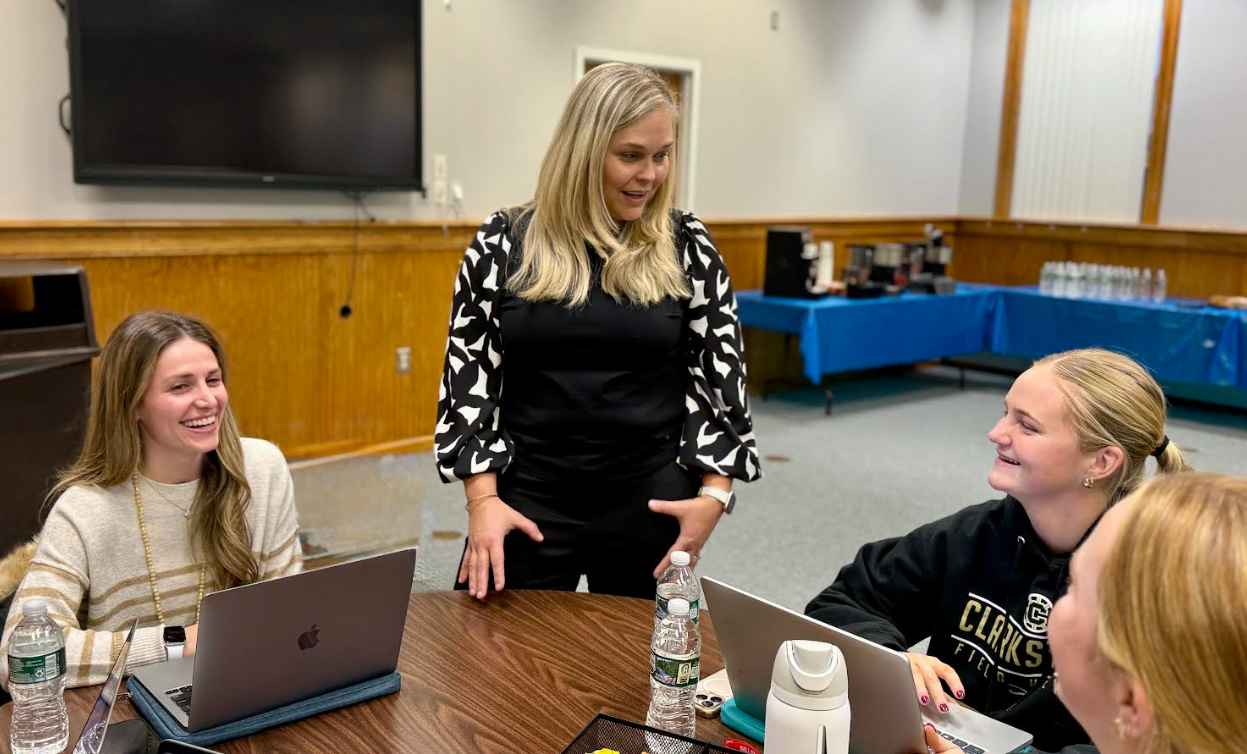Students’ Perspectives on 21st Century Learning

We often talk about how technology can improve our teaching and students’ learning, sharing anecdotes, lessons, and stories. And these stories are powerful. They capture a snapshot of our classrooms, relationships, and transformations in classrooms to share with the world.
Like many of you, I read other education blogs and articles, attend conferences, and present about my work and technology integration. I’ve even built a blog and part of my career around it. I work hard to help my students learn and master 21st century skills and to transform their education with collaboration, creativity, creation, and critical thinking.
But what do our students really think?
These conversations are valuable but they are usually more about the teacher than they are the students. They sometimes focus too much on how we teacher rather than how students learn, process, and grow.
So instead of discussing what I think, I wanted to flip it and ask the students what they think about 21st century #futureready learning. This data complements the stories and anecdotes I write about here and probably represents trends in all of our classrooms, helping us tell a more complete story about the power of purposeful and effective technology use in education.
Student Presenters at #LHRICTLI Tech Expo
Last week, I presented on this topic with three of my students at a local conference, the LHRIC Tech Expo in Westchester County, NY. My students volunteered to participate, and they had a lot to say. We decided to organize the presentation by skills. I introduced our work and goals while each student discussed successes, challenges, and models through the lens of communication, collaboration, and feedback. Then, I shared the data summarized below and we had a Q&A session with the audience.
In the next week or two, Zoe, Mike, and Melanie will blog about the experience and share their reflections on our presentation and the process. I’ll share the presentation and our resources, too.
But today, it’s about the data.
Tools and ideas to transform education. Sign up below.
Surveying 21st Century Learning Experiences
For the presentation, we decided that we wanted to present a larger and more well rounded data set on these issues. Three students can provide a lot of insight but don't necessary represent the masses. The easiest solution was to design a Google Form for my students. We only asked my classes to take the form because the learning experiences we were examining were particular to my class and my students.
Find the form here and an overview of the 51 responses below. It asks a mix of qualitative and quantitative questions, providing so much data on students’ opinions about technology, social media, student-centered learning, and more.
Defining 21st Century Learning
For consistency and clarity, we needed to first define 21st Century learning. We’ve discussed the transformative power of technology through our evaluation of modern schools with Genius Hour, so the concept was familiar to my students. We settled on the following simple definition:
Think of 21st Century Skills as anything that helps you create your own learning, collaborate, and communicate more effectively (with each other and with teachers). This often involves technology and things like Google Apps, Chromebooks, social media, Genius Hour, flipped lessons, and more.
What Students Think
First view the form, then explore the data. Below, find the students’ responses with some slight edits for grammar, clarity, and relevance.
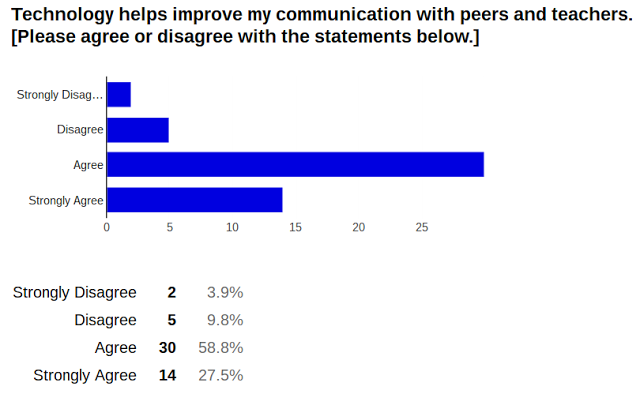
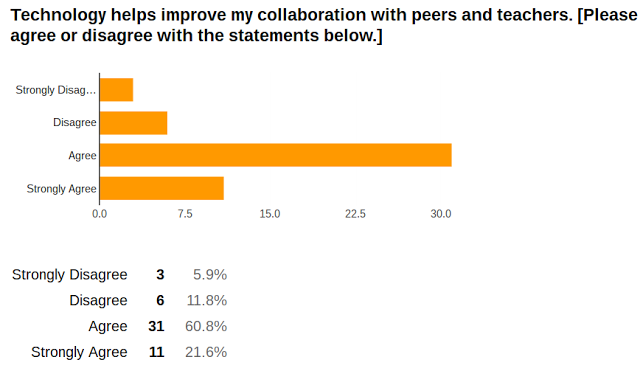
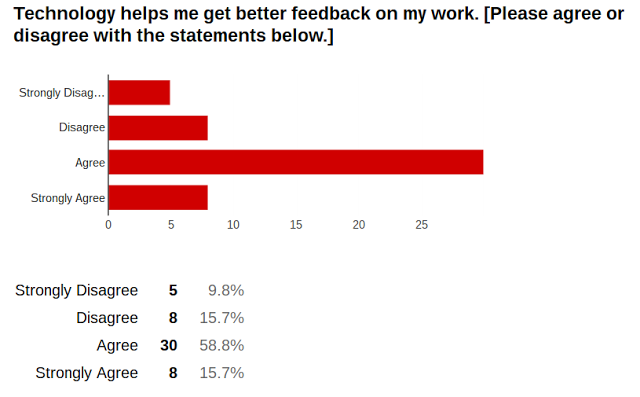
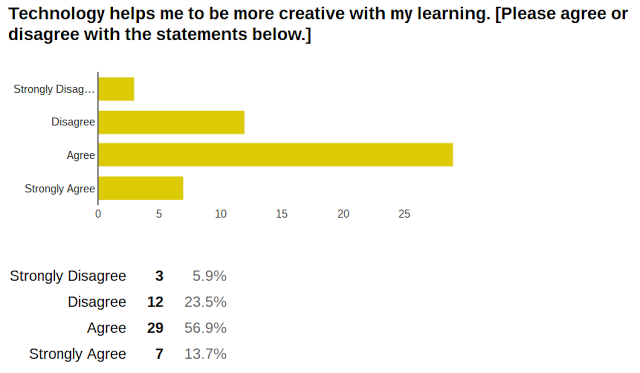
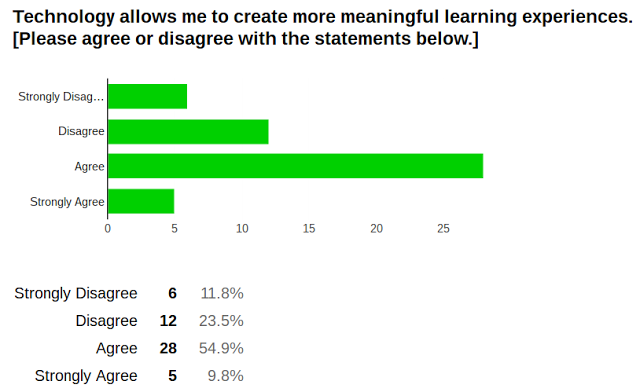
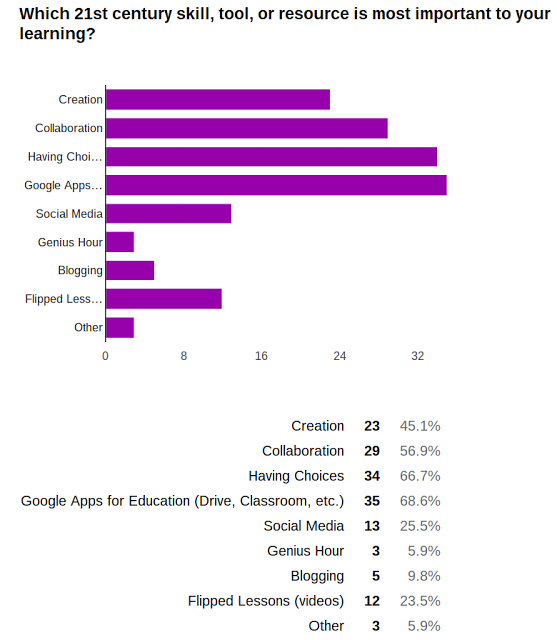
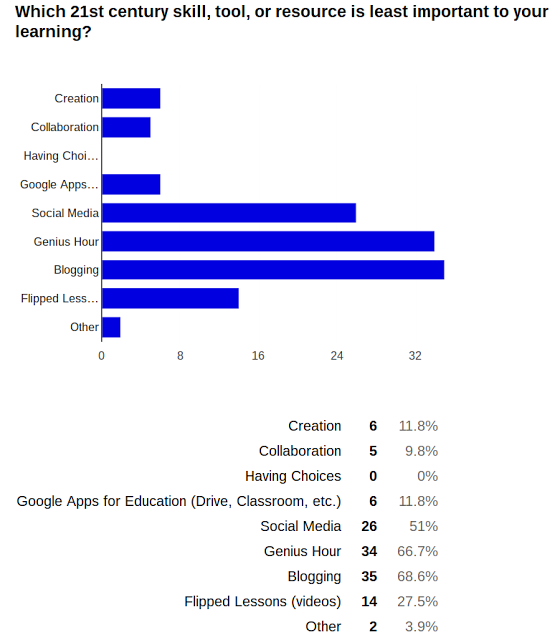
How does technology and the types of learning described above help to improve your learning? What do you like about it?
Excerpted Student Responses:
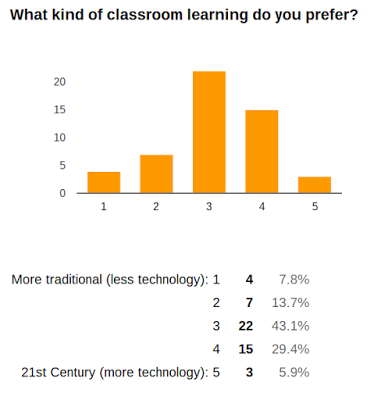
- Google Apps just makes the work more accessible and convenient
- I like the English calendar because it shows me all the work I have to do for the week so it helps me plan my work accordingly to my schedule.
- It allows others to view it and give constructive feedback to others and to you which is interesting
- Technology helps me communicate with the outside world.
- The ability to share documents over google drive and have friends review them I find to be extremely valuable. This connection has taught me things that I would never have learned or thought about in class.
- I enjoy being able to connect with my friends and classmates 24/7. I also like all the different choices that technology offers, like creating a video or powerpoint instead of just writing something down.
- Gives me a better perspective on things.
- It gives me a way to organize my assignments on the cloud so I can access them at any time on any device.
- I like the work that can be posted online and that is homework instead of taking home packets or worksheets.
- You can virtually learn anywhere. If you miss a day you can get caught up because of the accessibility to the web
- Technology allows me to share out my ideas as well as get feedback from people all over the world.
- Having choices allows students to be more interested in what they're doing.
- It helps because I can access information faster and it helps me with normal everyday skills, especially when collaborating. Having choices forces me to think and be independent.
What are the challenges or problems with technology and the types of learning described above? What don't you like about it?
This question yielded interesting responses, with three common themes: concerns about access/equity, technology glitches, and online distractions. 80% of student responses discussed at least one of these three trends.
- It is very easy to forget about work and it is harder to get face to face feedback from teachers
- Some challenges are if you don't have access to internet at your home it could be difficult to complete assignments.
- Almost everything you do with technology you need wifi or use cellular data. You can't always get wifi or wifi for free. Also cellular data is starting to get more expensive.
- I find technology to be extremely distracting, and deadlines are super easy to miss. I will often go on my computer to do my English homework, only to find myself two hours later having scrolled through Facebook. All of a sudden I'm about to (or do) miss a deadline.
- I worry about my privacy online, since I know that Google is collecting my personal data. I also think that having less technology in the classroom might encourage face-to-face debate and conversational skills.
- You can get lost in it, it's not like a face to face conversation
- Due to technology's flaws sometimes a simple glitch can result in a late submission of an assignment. Additionally, we are becoming so dependent on technology, but it isn't always available to us; in a way technology is hindering our skill of self- reliance.
- In the case of a flipped lesson I find it harder to understand and I can't ask questions because it was recorded.
- Some teachers don't know how to use technology in a meaningful way.
- The challenge that I’m not understanding enough of technology
Please share your thoughts on Twitter or in the comments below.
I look forward to sharing our presentation and the students’ reflections soon. After writing this, I realize that I want to spend some time discussing and analyze the results in the future, and would love your thoughts on that, too.
cross posted at www.aschoenbart.com
Adam Schoenbart is a high school English teacher, Google Education Trainer, and EdD candidate in Educational Leadership. He teaches grades 10-12 in a 1:1 Chromebook classroom at Ossining High School in Westchester County, NY and received the 2014 LHRIC Teacher Pioneer Award for innovative uses of technology that change teaching and learning. Read more at The SchoenBlog and connect on Twitter @MrSchoenbart.
